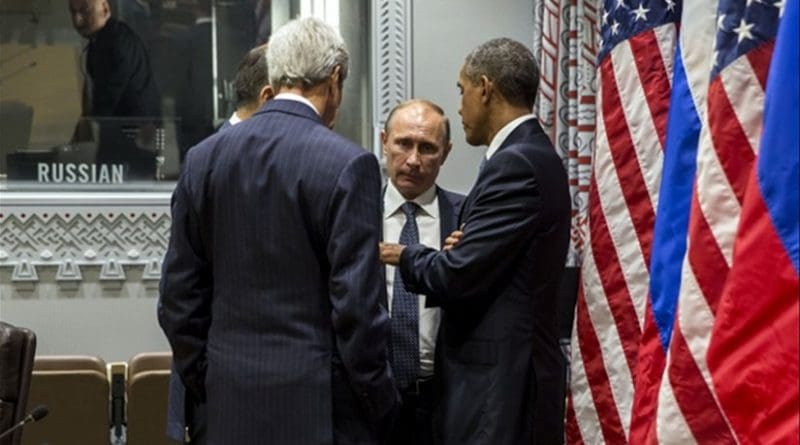West Asia: A New Order Shaped By Russia Emerges – Analysis
By Observer Research Foundation
By Harsh V. Pant
As the evacuation of rebel-held eastern districts of the Syrian city of Aleppo continues, a new order seems to be emerging in West Asia. The UN Security Council (UNSC) has unanimously called for UN officials and others to play a role in observing the evacuation of people from the last rebel-held slivers of eastern Aleppo. The 15-member council overcame long-held divisions — that have pitted Syrian ally Russia and China against western powers over the Syrian conflict — to adopt a French-drafted resolution calling for UN officials and others “to carry out adequate, neutral monitoring and direct observation on evacuations.”
Syrian rebel groups had set fire to a number of buses intended to evacuate residents of mostly Shia villages in Syria’s Idlib province last week and killed one bus driver. The buses were part of a deal to allow for the mutual evacuation of civilians from formerly rebel-held areas of eastern Aleppo and regime-held villages in Idlib. Difficulties in implementing the deal for the evacuation of eastern Aleppo, hammered out by Turkey and Russia, led France to push for a UNSC resolution allowing international observers to monitor the evacuations.
US secretary of state John Kerry, however, had to call the Russian and Turkish foreign ministers to talk about Syria and discuss Monday’s assassination of the Russian ambassador to Turkey. It was the only way Washington could get an update since the two diplomats pointedly did not invite him to participate in talks being held with Iran in Moscow to hash out next steps in Syria.
The US state department put a gloss over it by suggesting that the ministers “provided the secretary a sense of how the discussions went,” but “if not having us in the room can lead to finally a cessation of hostilities that can actually matter,” then Kerry — publicly at least — is okay with that. But Washington’s exclusion is a profound rebuke after two years of American bombing, and months of fruitless diplomacy between Kerry and his Russian counterpart Sergei Lavrov. It also underscores the growing irrelevance of the US in the unfolding drama in the region.
For his part, for the first time since being elected president, Donald Trump pledged to create “safe zones” in Syria for civilians. “When I look at what’s going on in Syria, it’s so sad,” he told a crowd in Pennsylvania. “It’s so sad, and we’re going to help people.” He said he would ask the Persian Gulf nations to put up money for the project, adding, “we’ll build and help build safe zones in Syria, so people will have a chance.” It is not clear if Trump plans to establish a no-fly zone in northern Syria, and if American aircraft would defend the area from Syrian and Russian airstrikes.
The presence of the Russian commandos in Aleppo shows just how important it is for Moscow to have Aleppo under the control of the Syrian government by time Trump takes office in January, when the US government is expected to move to work more closely with Moscow on a range of issues. Moscow doesn’t see any reason for Russian or Syrian forces to get engaged in any negotiations before the fall of Aleppo and it won’t be with an Obama administration, which is now in lame duck mode.
However, the new role Russia is playing in West Asia comes with a price tag. Moscow may be a new power broker in the region, but the assassination of Russia’s ambassador to Turkey has underscored the growing costs of this role.
As America’s influence has shrunk, Russia has taken the place the US long occupied in the minds of many people in West Asia: An alien imperialist power seen as waging war on Muslims and Islam. Even as protests against Washington have dwindled in West Asian capitals, thousands of protesters converged this month outside Russian missions from Istanbul to Beirut to Kuwait City — where they chanted: “Russia is the enemy of Islam.” Russian warplanes have operated with the regime in Syria to pound civilian targets — especially in Aleppo — since September 2015. It has been estimated that Russian airstrikes in and around Aleppo killed over 1,000 civilians in November alone.
Left out of the efforts by Russian and Turkish officials about fighting terrorism in Syria is any mention of the US. This week Russia, Iran and Turkey kicked off a new round of meetings in Moscow aimed at finding a resolution to the civil war in Syria. While foreign ministers from the three countries huddled in one part of the Russian capital, a separate meeting brought together defence ministers from the same trio, where Iranian defence minister Hossein Dehghan praised military cooperation between Ankara and Moscow in Syria. Iran says it’s now sharing a base with Russia in Syria. Iran’s Supreme National Security Council secretary Ali Shamkhani told Iranian media that its “advisors” in Syria are working out of a shared facility with Russia. The subject of Russian bases and Syria has been a touchy one for Iran ever since Russia’s revelation that its jets had used an airbase in Iran to support its air campaign over Syria. Iranian officials reacted strongly to the announcement, saying that the Russians violated their trust and revoking their access to the facility. But Russia and Iran continue to work together to achieve their aims in West Asia.
It is quite clear that the old order is crumbing the region. And unlike in the past when the West was the lead player in shaping the strategic environment, it is Russia which seems in the driving seat today.
This article originally appeared in the Hindustan Times.

